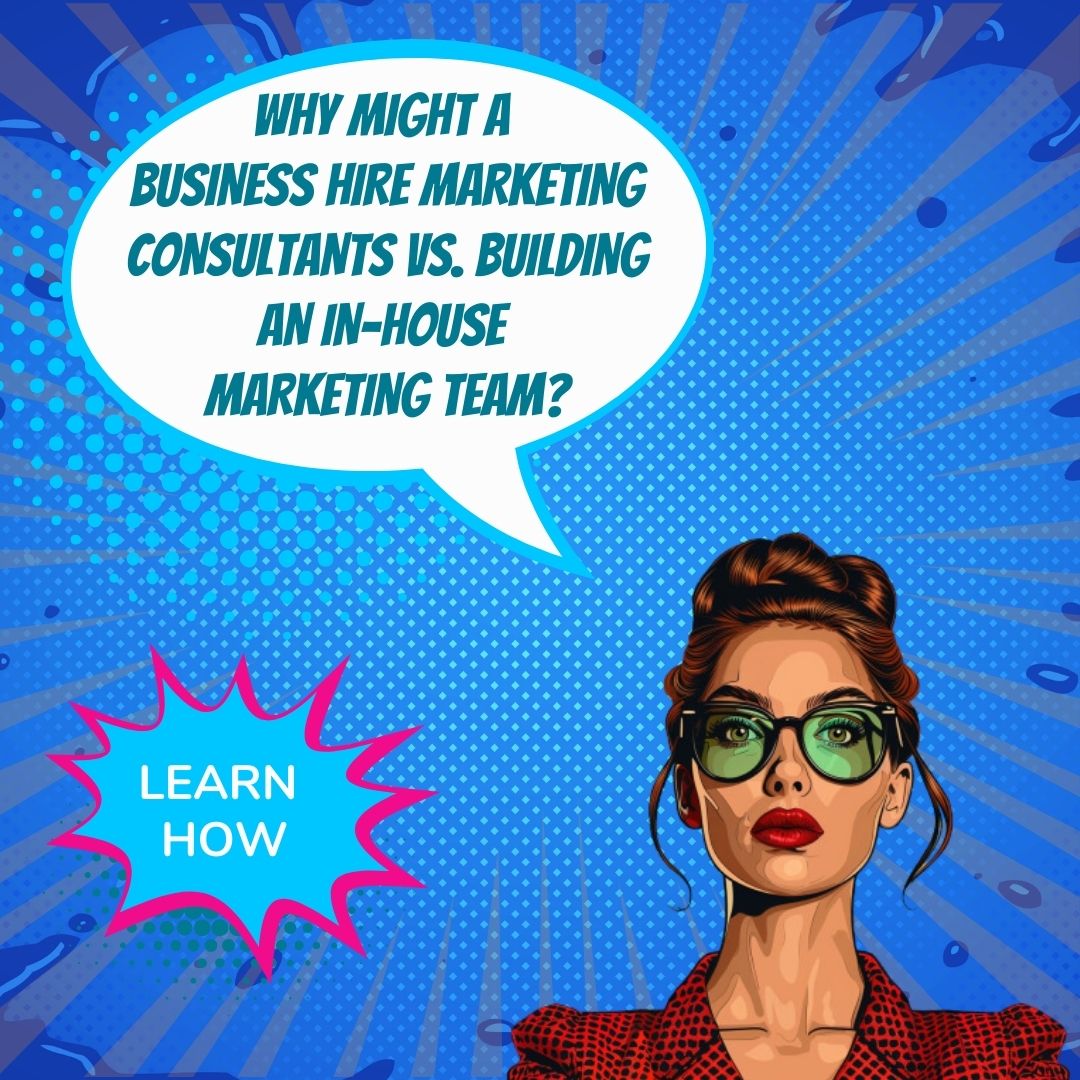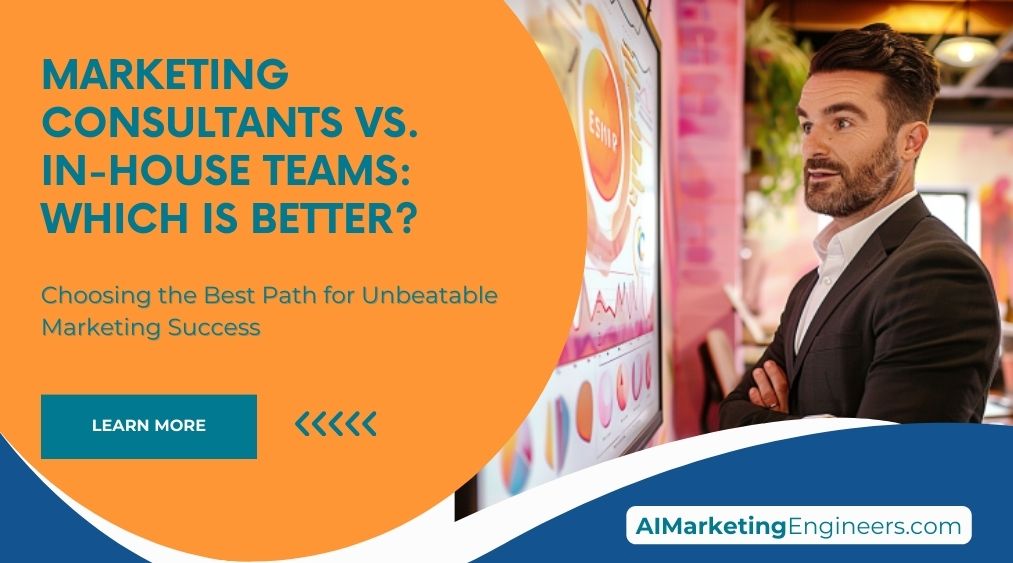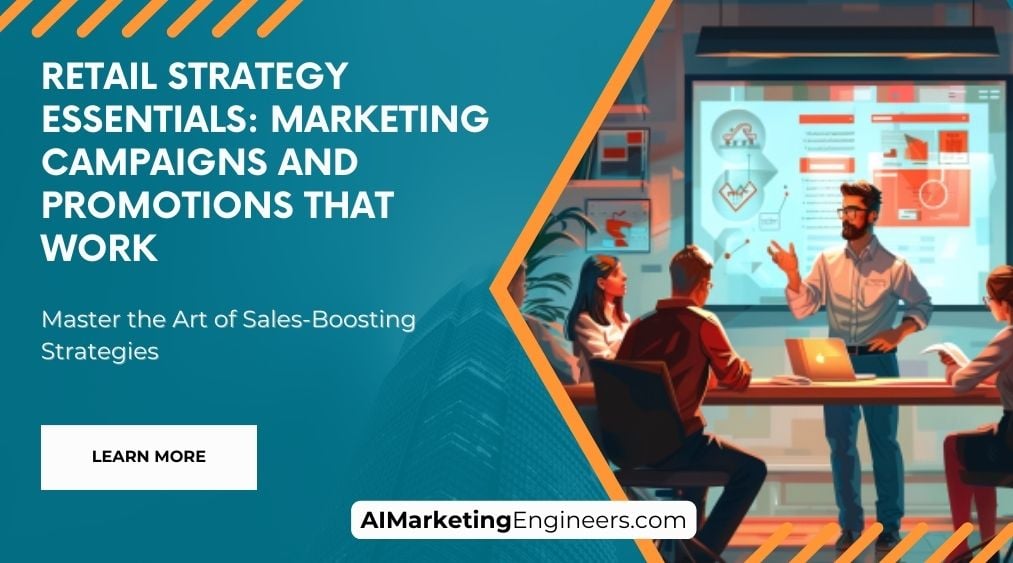Key Takeaways
✅ Cost and Expertise: Outsourcing to a marketing agency can be more cost-effective than hiring an in-house team. Agencies offer economies of scale and a diverse range of specialized expertise, covering areas like Facebook marketing, Google Ads, SEO, or email marketing. Consider if your business would benefit from such specialized skills.
✅ Control and Flexibility: An in-house team allows for more direct control and seamless communication, giving a business more input in crafting its marketing strategies. Conversely, outsourcing provides greater flexibility, as efforts can be scaled more easily. This method shifts the burden of managing salaries, benefits, and training to the agency.
✅ Hybrid Approach: Combining an in-house team with agency services brings the best of both worlds. This model enhances control and expertise while leveraging specialized skills from diverse external professionals. Integrating these resources could provide a well-rounded marketing strategy, potentially yielding better results.
 Introduction
Introduction
Are you struggling to decide between hiring marketing consultants and building an in-house team? This choice is crucial for your business's marketing success. Companies must consider factors like costs, expertise, control, and flexibility to make an informed decision. Striking the right balance can lead to a more effective marketing strategy. This article explores the benefits and drawbacks of each option, offers insights on modern trends, and uncovers actionable strategies to help you optimize your marketing efforts. Read on to uncover groundbreaking information and tips to maximize ROI.
Top Statistics
| Statistic | Insight |
|---|---|
| 69% of junior and mid-level marketers are seeking in-house roles compared to just 11% seeking work in agencies. | This shift reflects the growing preference for more stable positions and opportunities for growth within in-house teams. |
| Companies of all sizes have reduced expenses in creative content production by more than 30% by using in-house marketing teams. | Cost-effectiveness is a major factor that makes in-house teams an attractive option for businesses looking to maximize their marketing budgets. |
| Hiring a marketing agency can save up to 43% on operational costs compared to maintaining an in-house team. | Despite the efficiency of in-house teams, agencies still offer significant savings, highlighting their value in certain contexts, especially for smaller businesses and startups. |
| In-house marketing teams provide faster workflow and easier communication and collaboration. | Companies benefit from enhanced collaboration and streamlined processes, which can lead to quicker project completions. |
| Independent marketing consultants have comprehensive experience and can analyze the company’s needs, budget, and performance. | Consultants bring a level of expertise that can be critical in shaping effective marketing strategies and addressing unique business challenges. |
Navigating Marketing Choices: In-House Teams vs. Marketing Consultants
Businesses often face a dilemma when deciding between in-house marketing teams and hiring marketing consultants. This choice is critical as it can heavily influence the success of a company's marketing strategy. Choosing the right path requires careful consideration of various factors to align with business goals.
The Case for In-House Teams
One of the core advantages of having an in-house marketing team is brand familiarity. Team members live and breathe the company’s brand, ensuring a deep understanding of the business. This leads to more consistent and authentic messaging. Additionally, accessibility and communication are streamlined, as in-house teams are readily available for meetings and quick adjustments.
In-house teams also allow companies to maintain control and a focused approach toward their marketing efforts. Employees working within the company often exhibit dedication and motivation that can drive strong, vested interest in the company’s success. However, it’s important to consider the cost. Maintaining an in-house team can average $250,000 annually, a significant investment for many businesses.
The Case for Marketing Consultants
Marketing consultants offer significant advantages including flexibility and scalability. These professionals can tailor their services to match a company’s fluctuating needs, making it easy to handle both small projects and large campaigns. A major benefit is accessing specialized skills and expertise without extensive training.
For many businesses, marketing consultants are a cost-effective solution, with costs ranging from $20,000 to $200,000 annually depending on the required scope of work. This broad range allows companies to find a consultant that fits their budget. Furthermore, consultants can augment in-house teams by bringing in unique skills or acting as a fractional marketing leader during crucial periods.
Hybrid Approach: Combining In-House and Agency Resources
Leveraging both in-house talent and marketing agencies can offer the best of both worlds. This hybrid approach covers each side's shortcomings, enabling a more comprehensive marketing strategy. Agencies can bring in specialized expertise that might be lacking in-house, effectively augmenting the team’s capabilities.
Another significant benefit is the potential for cost savings and greater flexibility. By strategically allocating tasks between in-house staff and external experts, businesses can optimize their marketing spend while maintaining agility.
Key Considerations for Business Decision-Makers
When deciding between in-house teams and marketing consultants, several factors come into play:
1. Company Culture, Vision, and Values: Alignment with these aspects can determine whether an in-house team will thrive or if an external consultant will provide fresh perspectives.
2. Need for Wide-Ranging Skill Sets: Evaluate whether the marketing requirements demand diverse skills that a consultant might better provide.
3. Budget and Resource Constraints: Understand financial limits and how they influence the choice between a full-time team and flexible consultants.
4. Short-term and Long-term Goals: Assess how each option aligns with immediate priorities and future objectives.
5. Ability to Manage and Control Marketing Expectations: Consider the company's capacity to oversee marketing operations effectively.
By weighing these considerations, businesses can make an informed decision that aligns with their needs and goals, potentially combining elements from both approaches for enhanced marketing success.
In conclusion, whether a business chooses an in-house team, a consultant, or a hybrid model, the emphasis should be on strategic alignment with their marketing aspirations.

AI Marketing Engineers Recommendation
Recommendation 1: Evaluate Cost and Scalability: When choosing between marketing consultants and in-house teams, consider cost and scalability. According to a survey by Deloitte, 57% of businesses reported outsourcing some of their marketing functions due to cost-effectiveness. Consultants can be hired on a project basis, which often costs less than maintaining an in-house team. This flexibility allows companies to scale up or down quickly based on current marketing needs and budget constraints.
Recommendation 2: Leverage Specialized Expertise and Current Trends: Marketing consultants often bring specialized expertise that can be hard to find in an in-house team. A report by HubSpot states that 70% of companies using consultants saw higher conversion rates due to their specific skills in areas like SEO, content creation, and social media strategy. By employing consultants who are up-to-date with the latest marketing trends, businesses can gain a competitive edge without the need for continuous training of their in-house staff.
Recommendation 3: Utilize Performance Tracking Tools: Whether you choose consultants or an in-house team, implementing performance tracking tools is crucial. Tools like Google Analytics and HubSpot provide insights into customer behavior, campaign performance, and ROI. These tools enable businesses to make data-driven decisions, ensuring that every marketing dollar is spent effectively. Utilizing these tools can lead to improved marketing strategies and better business outcomes.
Relevant Links
- Master Digital Marketing with AiMarketingEngineers
- Unlock Key Factors for Campaign Goals
- Boost Your Market Penetration
- Optimize Marketing with User Data
- Transform Marketing with Personalization
Conclusion
In summary, choosing between in-house marketing teams and marketing consultants is no simple task for businesses aiming for marketing success. In-house teams offer several benefits, including intimate brand familiarity, seamless communication, and a strong, focused dedication. However, they come with a significant cost, averaging $250,000 annually. On the other hand, marketing consultants provide flexibility, access to specialized skills, and often greater cost-effectiveness, with expenses ranging from $20,000 to $200,000 per year.
The hybrid approach—blending in-house talent with external agency expertise—presents a compelling solution. This combination can effectively cover each entity’s weaknesses, enhance resources, and allow for both cost savings and scalability. Business decision-makers must carefully assess their company's culture, needs, and long-term goals when deciding the best path forward.
Ultimately, there is no one-size-fits-all answer. The key lies in aligning the chosen strategy with business goals and resource constraints. A well-thought-out decision that possibly embraces a hybrid model could pave the way for achieving unparalleled marketing success. As you weigh these options, consider how each can be tailored to meet your unique requirements and drive your business forward.

FAQs
Question 1: What is in-house marketing?
Answer: In-house marketing involves managing marketing activities within a company by employing an internal team. This team is responsible for creating, executing, and tracking marketing strategies and campaigns exclusively for the company.
Question 2: What is a marketing agency?
Answer: A marketing agency is an external or third-party contractor commissioned by a company to perform specific marketing campaigns for its products and services. Agencies typically work with multiple clients and charge fees or commissions for their services.
Question 3: What are the key differences between in-house marketing and agency marketing?
Answer: The main differences lie in cost, expertise, speed, control, and scalability. In-house teams offer more control and brand familiarity but can be costly and limited in their skill set. Agencies provide access to specialized expertise and flexibility but may lack intimate knowledge of the brand and require coordination efforts.
Question 4: How do I evaluate my company's needs and goals to decide between in-house and agency marketing?
Answer: Consider your long-term and short-term goals, areas that need improvement in your current marketing strategies, and your budget. If you're a small startup, an in-house team might be more suitable. For larger companies or those looking to scale quickly, an agency might be a better choice.
Question 5: What are the pros and cons of in-house marketing?
Answer: Advantages include direct control, in-depth knowledge of the brand, brand exclusivity, efficient communication, and collaboration. Disadvantages include recruitment challenges, limited expertise, high costs, and office space requirements.
Question 6: What are the pros and cons of working with a digital marketing agency?
Answer: Benefits include access to specialized expertise, diverse skills, scalability, cost-effectiveness, and industry insights. Drawbacks include reliance on external service providers, potential communication challenges, and reduced control.
Question 7: How can I ensure effective communication and coordination between an in-house team and a marketing agency?
Answer: Establish a clear marketing strategy, set unified objectives, and maintain transparent goals and expectations. Ensure effective communication channels are in place to facilitate collaboration.
Question 8: What is the hybrid model, and how can it benefit my marketing strategy?
Answer: The hybrid model combines an in-house marketing team with outsourcing specific tasks to an agency. This approach leverages the benefits of both methods, providing control and expertise while overcoming their respective challenges.
Question 9: How can I determine which approach is more cost-effective for my business?
Answer: Compare the costs of hiring and maintaining an internal marketing team with the fees and potential ROI of working with a marketing agency. Consider the long-term benefits and scalability of each option.
Question 10: What are the benefits of bringing in a third-party perspective through a marketing consultant or agency?
Answer: A third-party perspective can bring fresh ideas, creativity, and expertise, helping to avoid tunnel vision and marketing pitfalls. It can also provide access to cutting-edge technology and industry insights.

Academic References
- Ahmad, Y. Marketing Analysis: In-House Marketing vs Agency vs Consultant. This article highlights the benefits of hiring a marketing consultant, including their ability to analyze marketing strategies, develop reporting systems, and provide cost-effective solutions. It also emphasizes the importance of considering business decisions and managerial capacity when choosing between in-house marketing, agencies, or consultants.
- WSI World. In-House Marketing vs Agency Marketing. This article outlines eight key business factors to consider when comparing in-house marketing teams against outsourced marketing agencies, including company culture, vision, and values, as well as the need for wide-ranging skill sets. It emphasizes that one size does not fit all and that the choice depends on a company's specific marketing goals and strengths.
- Unlocking Success: The Power of a Marketing Consultant. This comprehensive guide covers the role and significance of marketing consultants in business growth, including their expertise, qualities to look for when hiring, and measuring their success. It also explores the choice between marketing consultants and in-house teams, providing valuable insights for businesses considering marketing consulting services.
- Laas, C. Agency vs In-housing is not an 'either/or' question. This article argues that client-side teams need agencies now more than ever and that these relationships need to evolve. It suggests that the agency and in-house teams can complement each other effectively.
- Thomson, P. J. In-house marketing vs agency-side. This article highlights the differences in approach between in-house marketing teams and external consultants. It notes that consultants may view in-house teams as conservative, while in-house teams may see consultants as lacking long-term commitment.







